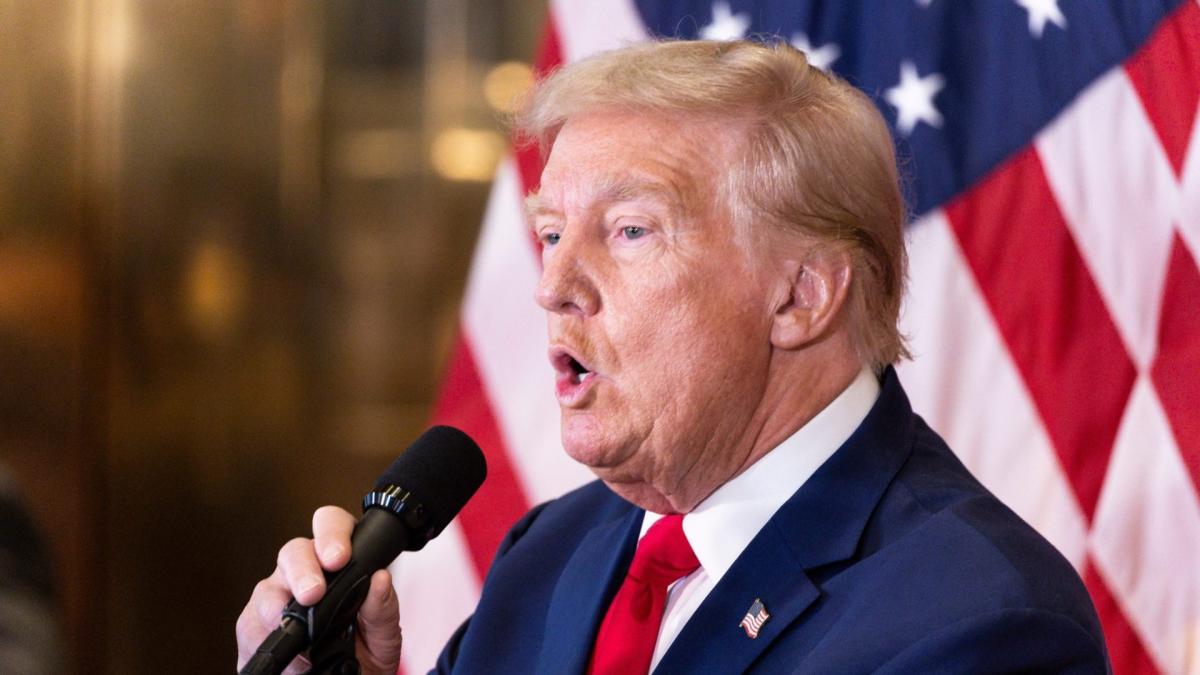This election year, the high cost of living is on the minds of many voters. Inflation-battered Americans are tired of soaring prices. As former President Donald Trump campaigns for a second term, he often points the finger at President Joe Biden for the skyrocketing costs of groceries and everything else.
Check Out: I’m an Economist: Here’s My Prediction for Social Security If Trump Wins the 2024 Election
Read More: 9 Things You Must Do To Grow Your Wealth in 2024
“He has not done a good job,” Trump said of Biden during the June 27 debate. “He’s done a poor job. And inflation’s killing our country. It is absolutely killing us,” he added.
While Trump promises to “end this nightmare” of inflation and hefty price tags, his policies could increase prices and impact shopping costs at big retailers like Amazon. GOBankingRates spoke to Peter C. Earle, Senior Economist, American Institute for Economic Research, who broke the situation down.
Earning passive income doesn’t need to be difficult. You can start this week.
Tougher Tariffs
Trump has said he wants to impose a 10% tariff on US imports or higher to save jobs. In an interview with TIME, he stated, “We have a ring around the country. A reciprocal tax also, in addition to what we said. And if we do that, the numbers are staggering.”
Read Next: What a Trump Presidency Could Mean for Social Security in 2025
He added, “I don’t believe it will have much of an effect because they’re making so much money off of us. I also don’t believe that the costs will go up that much. And a lot of people say, ‘Oh, that’s gonna be a tax on us.’ I don’t believe that. I think it’s a tax on the country that’s doing it.”
But that could backfire and hurt Americans financially, especially when it comes to shopping. Prices could increase.
“There’s an incredibly naïve idea that the governments of nations where goods and services are produced pay the tariffs,” Earle told us. “It’s nonsense at best and wishful thinking at worst. In fact, tariffs get passed directly from producers to consumers in the form of higher prices on those imported goods.”
Earle also noted that imported goods could also be affected.
“Tariffs on imported goods provide cover for domestic producers of competing goods and close substitutes to raise their prices,” he said. “In addition to that, retaliation is baked in. No nation ever imposes tariffs on the goods and services of a foreign country without having tariffs placed on theirs in return. Trade wars are never one-sided.”
No Tax on Tips
Trump and his opponent, Vice President Kamala Harris, support eliminating taxes on tip occupations like hospitality jobs, but there are potential economic repercussions.
“If a Trump administration were to exempt tips from taxes, it could lower payroll tax obligations for retailers (especially in the food service industry), which in turn would potentially reduce operational costs,” Earle explained.
However, he added, “That may not directly lead to lower prices, but it would allow businesses to reinvest those savings elsewhere. Workers, who are also consumers, would benefit from keeping more of their income, increasing their disposable income, and possibly reducing the turnover that plagues the service industry.”
The policy of not taxing tips is supposed to put more money in workers’ pockets; the drawback could put a financial strain on consumers.
“Businesses may need to adjust base wages, which could increase the cost of labor and drive consumer prices up,” said Earle. “There’s also a fairly big question mark around how, over time, exempting tips from taxation would affect consumer tipping behavior. If such a shift led to an increase of jobs expecting tips (or deemed ‘tipworthy’), the propensity among customers to award gratuities might actually decline over time.”
More Control on Fed Interest Rates
Trump has been vocal about wanting more of a say in the Federal Reserve’s interest rate policy. The Fed regulates everything from credit card loans to mortgage rates and is independent of the White House. The former president has openly complained about the Fed being bad for the economy, which has gone ignored.
“I feel the president should have at least (a) say in there,” Trump told reporters at his Mar-a-Lago residence in Florida. “I think that in my case, I made a lot of money, I was very successful, and I think I have a better instinct than, in many cases, people that would be on the Federal Reserve or the chairman.”
However, a second term for Trump might come with increased pressure on the Fed to give a president more power regarding interest rates, which concerns economists.
“If a US President had a say in FOMC decisions, it could lead to policies that favor short-term economic boosts, such as lowering interest rates to stimulate growth before an election, resulting in long-term inflationary pressures, price distortions, or even systemic financial instability,” Earle previously explained to GOBankingRates.
In addition, “The politicization of monetary policy could lead to economic and financial volatility, with inflation spikes or financial bubbles becoming more likely as the market reacts to politically animated decisions rather than sound, balanced policy direction,” Earle stated.
Editor’s note on election coverage: GOBankingRates is nonpartisan and strives to cover all aspects of the economy objectively and present balanced reports on politically focused finance stories. You can find more coverage of this topic on GOBankingRates.com.
More From GOBankingRates
This article originally appeared on GOBankingRates.com: I’m an Economist: How a Trump 2024 Win Could Impact the Price of Shopping on Amazon

